Switch to the mobile version of this page.
Vermont's Independent Voice
- News
- Arts+Culture
- Home+Design
- Food
- Cannabis
- Music
- On Screen
- Events
- Jobs
- Obituaries
- Classifieds
- Personals
Browse News
Departments
-
Education

Scott Official Pushes Back on Former State…
-
News

Burlington Budget Deficit Balloons to $13.1 Million
-
Education

Senate Committee Votes 3-2 to Recommend Saunders…
- Court Rejects Roxbury's Request to Block School Budget Vote Education 0
- Norwich University Names New President Education 0
- Media Note: Mitch Wertlieb Named Host of 'Vermont This Week' Health Care 0
Browse Arts + Culture
View All
local resources
Browse Food + Drink
View All
Browse Cannabis
View All
-
Culture

'Cannasations' Podcaster Kris Brown Aims to 'Humanize'…
-
True 802

A Burlington Cannabis Shop Plans to Host…
-
Business

Judge Tosses Burlington Cannabiz Owner's Lawsuit
-
Health + Fitness

Vermont's Cannabis Nurse Hotline Answers Health Questions…
-
Business

Waterbury Couple Buy Rare Vermont Cannabis License
Browse Music
View All
Browse On Screen
Browse Events
Browse Classifieds
Browse Personals
-

If you're looking for "I Spys," dating or LTRs, this is your scene.
View Profiles
Special Reports
Pubs+More
After a Lost Pandemic Year, the Burlington Discover Jazz Festival Is Back
Published June 2, 2021 at 10:00 a.m.
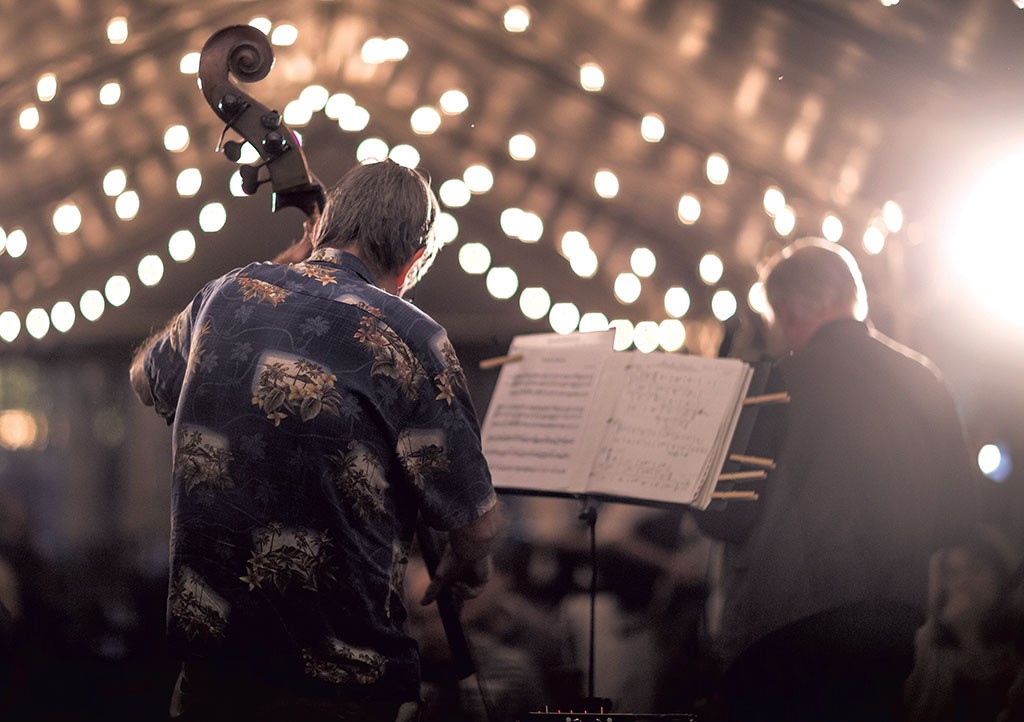
- File: Luke Awtry
The 2021 Burlington Discover Jazz Festival won't be the biggest. And it probably won't be the best. Considering the festival's storied 38-year run, that's a high bar to clear even in a normal year — which, this just in: 2021 is not. But the scaled-down version of the BDJF that kicks off this weekend on outdoor stages around the city does deserve a superlative: The 2021 festival is the most significant in the event's history.
"It feels metaphorically outsized," Steve MacQueen, artistic director of the Flynn, said of this year's festival. "It's larger than just this list of shows; it's something a little bigger than that."
MacQueen, who coordinated the jazz fest this year with help from Burlington City Arts and Nectar's, gets paid to say cool stuff like that about it. But his observation is spot-on.
Even in non-pandemic years (remember those?), for 10 days in late May and early June the BDJF is as symbolically important to Burlington as it is inescapable. It's the Queen City's crowning musical event, sure. But it's also, with apologies to Memorial Day weekend, when a Burlington summer begins in earnest.
"The jazz festival is my favorite event here," said MacQueen, whose first day working at the Flynn was the opening day of the festival in 2012. "It's the gateway to summer, the beginning of this whole new phase of Vermont life."
Why "It's the gateway to summer" has never been the festival's tagline is a mystery. In 2021, though, MacQueen's apt phrase "whole new phase of Vermont life" refers to a lot more than the changing seasons.
Running from Friday, June 4, to Sunday, June 13, BDJF 2021 will be the first major in-person cultural event held in Vermont since the pandemic hit in March 2020. We'll spare you the detailed recap of our miserable year without live music — you were here, and it sucked, for reasons far graver than a lack of entertainment. Still, take a moment to consider all of the music festivals, concerts and series that were canceled over the past 15 months: Ben & Jerry's Concerts on the Green, Grand Point North, the Lake Champlain Maritime Festival and Waking Windows (twice).
That's a very partial list.
Vermonters have been starved for music. We've also been starved for each other. So, there's something cosmically right about the confluence of the return of the state's highest-profile music festival and the easing of the restrictions that have kept us apart.
By the time BDJF 2021 ends, those COVID-19 restrictions might even be lifted entirely. Gov. Phil Scott has said he plans to take that step once 80 percent of Vermonters are vaccinated, a threshold that could be reached this week. The Burlington City Council is expected to vote on repealing the city's mask mandate on Monday, June 7. By the middle of the festival, Burlington could look and feel as close to "normal" as it has in a long time.
Cue the damn trumpets. And saxophones. Maybe a tuba.
BDJF 2021 "is even more important, because it's about getting back to life," MacQueen said. "This year's festival is about celebrating getting together, and it's sort of a gateway to that."
He added, "This year, I feel that it's a much bigger event than usual, even as it's scaled down for all the obvious reasons."
Organized by a skeleton crew on a shoestring budget and a dramatically shortened timeline, this year's festival is indeed a more modest affair than it has been in the past. No titans like Sonny Rollins or Mavis Staples will play the Flynn Main Stage, and there will be no world-famous reggae artists such as Lee "Scratch" Perry at the Waterfront Tent. You won't be able to say you saw before-they-were-famous stars such as Ledisi or Esperanza Spalding in the Flynn Space this year.
Instead, the entire BDJF 2021 will be held outdoors. And, except for a few ticketed shows in the alley at Nectar's and on the back patio at Halvorson's Upstreet Café, it's free.
"We wanted it to be as free as possible and as outdoors as possible," MacQueen said.
The festival's lineup is composed almost entirely of local and regional talent — which, actually, isn't all that different from any other year.
Big names such as Tony Bennett, Pharoah Sanders and Dianne Reeves may spice up the Flynn marquee each June, but local musicians have always been the backbone of the festival, whether they're Vermont staples such as Paul Asbell, James Harvey and Jenni Johnson or prodigal favorites such as Jennifer Hartswick, Nick Cassarino and Parker Shper. The bulk of the BDJF's free programming, which accounts for hundreds of hours each year, is homegrown.
The only real difference this year is that locals get to take center stage — or stages — on the Church Street Marketplace, in parks around the city and in front of the Flynn marquee on Main Street for the festival-closing block party.
"They are the spotlight," MacQueen said of Vermont musicians. "We're lucky to live in this absurdly musically rich community ... where locals can sustain a 10-day festival like this. I've lived in much bigger cities that couldn't do that."
The following pages explore more of what BDJF 2021 has in store while also looking back at how some participants weathered the past year. We learned from a pair of elementary school music educators about teaching music in a pandemic. We checked in with prominent local sax player Brian McCarthy, who survived COVID-19.
We chatted up Saint Michael's College associate professor of fine arts Bill Ellis about the musical dialogues he helps foster among seemingly disparate players — including composer Daniel Bernard Roumain, who also shared thoughts about the past year. And, of course, we highlight some shows not to miss. Finally, turn to page 42 for a remembrance of the late Anne Bemis, one of Burlington's most avid jazz supporters.
Scaled down or not, the real key to the Burlington Discover Jazz Festival is and always has been right there in its name: discover. Even a pandemic can't take that away.
"There are always moments that grab me that I wasn't expecting," MacQueen said. "So, for me, this year, I'm probably most excited to be outside hearing music again."
Right again, Steve.
— D.B.
Burlington Discover Jazz Festival, Friday, June 4, through Sunday, June 13, at various locations in Burlington. discoverjazz.com
Delvon Lamarr Organ Trio
Friday, June 4, 5:30 & 8 p.m., at the Backyard at Nectar's. $35. 21+.
One of the only nonlocal acts on this year's BDJF bill, Seattle's Delvon Lamarr Organ Trio are a newish group with an old-school sound. Since 2015, organist Lamarr, guitarist Jimmy James and drummer Dan Weiss have pumped out two full-length studio albums and one live record of instrumental funk. Per a description on the band's website, they tap into Motown and Stax Records vibes, as well as feature "cosmic Jimi Hendrix-style guitar."
Each of the band's releases is dynamic and scintillating, zeroing in on Lamarr's sensational skills. With a Hammond at his fingertips, the bandleader produces a retro sound that straddles the fence between chill groove and dance fervor. Expect to hear selections from the trio's 2021 LP I Told You So, which includes a smokin' cover of George Michael's yearning classic "Careless Whisper."
— J.A.
Dwight & Nicole featuring DBR
Saturday, June 5, 3 p.m., at Roosevelt Park. Free.
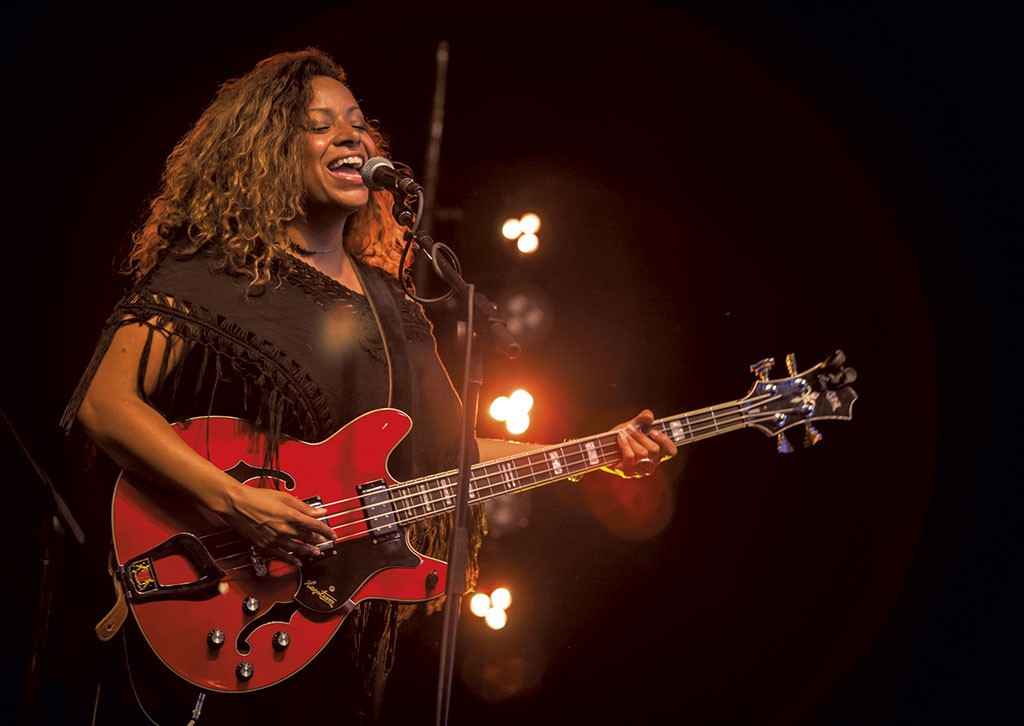
- File: Luke Awtry
- Nicole Nelson
Guitarist Dwight Ritcher and bassist Nicole Nelson have been partners in music and life since the early 2000s. After years of living in Boston and New York City, the couple settled in Burlington in the early 2010s, quickly establishing themselves as noteworthy players, singer-songwriters and performers.
For their 2018 EP Electric Lights, Dwight & Nicole expanded from a duo to a trio as drummer Ezra Oklan officially joined the band. He's a seasoned sideman known for his work in Kat Wright's band and, later, his own pet project, rock band Matthew Mercury.
Dwight & Nicole have an expansive sound that spirals outward from a foundation of blues, extending into soul, R&B and tinges of Americana. In 2020, they released the sultry slow-jam "The Next Go-Round." Languid, loose and throbbing with heavy bass, the song leans heavily into traditional gospel vibes.
For their Roosevelt Park performance, Dwight & Nicole team up with violinist, composer and Flynn creative chair Daniel Bernard Roumain, aka DBR.
— J.A.
Sick Player: Saxophonist Brian McCarthy Talks About Recovering from COVID-19
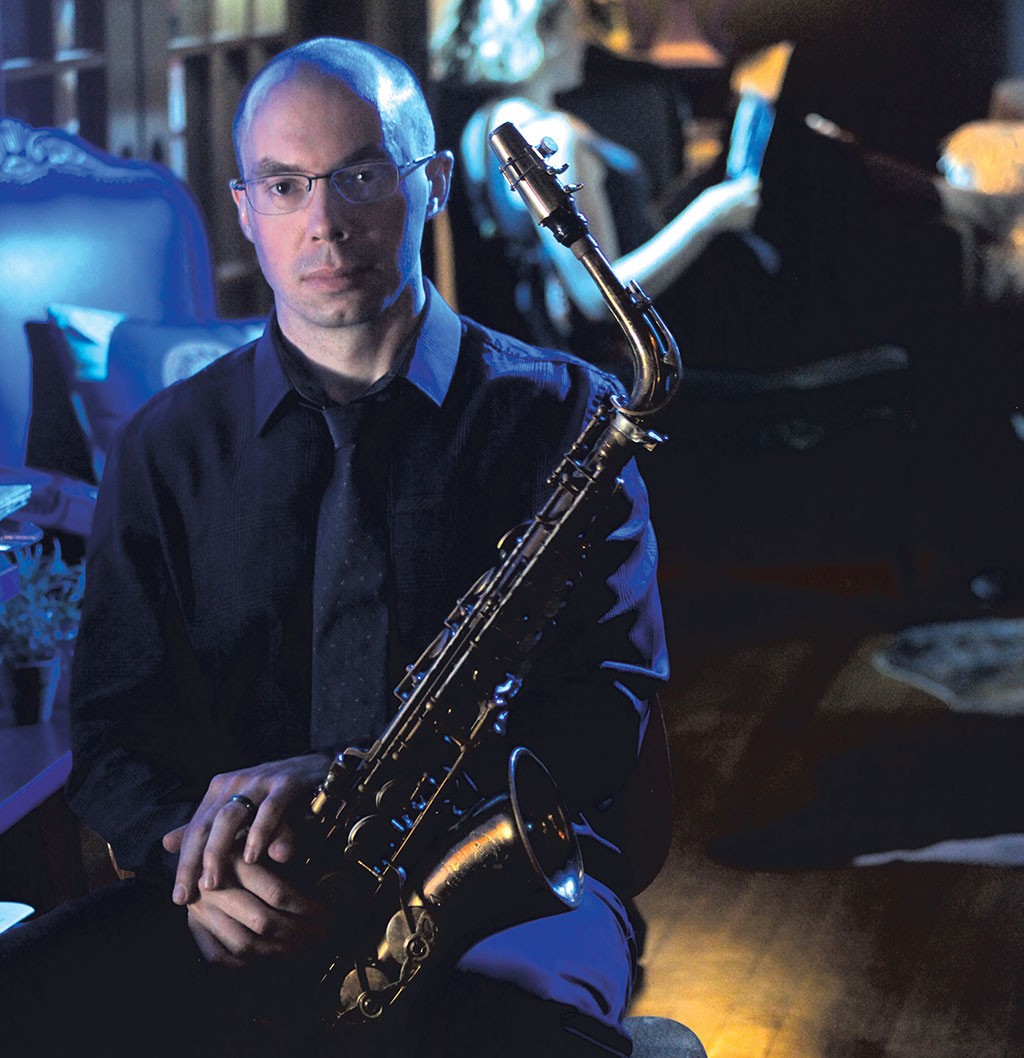
- Matthew Thorsen
- Brian McCarthy
When the coronavirus began its rapid U.S. spread in March 2020, confusion and uncertainty reigned. The first to get sick were essentially test subjects, as doctors and scientists frantically tried to gain understanding of the virus. One of those early victims was local saxophonist Brian McCarthy, who said he felt demolished by the virus in the middle of that month.
"Got ahead of the curve on that one," McCarthy joked during a videoconference with Seven Days.
McCarthy hasn't played a concert since early 2020 and said he literally had to dust off his instruments for jazz fest preparations. On Monday, June 7, he'll team up with rapper Edwin Owusu as part of the festival's Conversations series. For Thursday, June 10, he's worked up new arrangements of famous jazz tunes for a program called Brian McCarthy's Neo-Standards, which he'll perform with eight other players.
McCarthy is a music instructor at the University of Vermont and Saint Michael's College. He's also an acclaimed composer whose 2017 album The Better Angels of Our Nature explored popular Civil War-era music through the lens of modern jazz.
In fact, McCarthy was probably exposed to the virus while performing selections from Better Angels at the Sunday Jazz Room Series at his alma mater, William Paterson University in New Jersey. The March 8 show was later identified as a super-spreader event.
"Social distancing and masks weren't a thing at that point," McCarthy said. He began experiencing symptoms about a week and a half later and knew something was wrong.
"I live a very healthy lifestyle, and I'm used to being in really good health," McCarthy said. "It takes a lot for me to even go see my primary care provider."
Because he didn't exhibit all three major symptoms of COVID-19 that were identified at that time (fever, dry cough, loss of taste and smell), McCarthy wasn't immediately diagnosed with the disease. A couple of days after his initial checkup, though, he had trouble breathing. A middle-of-the-night trip to the emergency room didn't help, because treatment protocols for COVID-19 hadn't yet been established and streamlined.
"Unless you need to go on a respirator, go home," McCarthy said of his experience in the ER.
While he was spared the need for a respirator, his symptoms persisted for months, a frustrating ebb and flow. "I've never been sick like that, and I've never been sick that long," he said.
McCarthy continued to teach virtually, but he was way off his A game. Coughing fits were regular occurrences.
"You get really good with the mute button," he joked.
Being a seasoned saxophone player, McCarthy has significant lung capacity. He also has mild asthma, but his inhalers usually expire before he exhausts them. March to September 2020 was different: As his lungs healed from COVID-19, McCarthy said, he went through two and a half inhalers.
"The longer-lasting issues for me [were] the head fog and some dietary stuff," he said, describing a diet that consisted mainly of ginger tea and saltine crackers when he was sickest. Most disconcerting, however, was the overall malaise, which temporarily cost him his ability to memorize music.
Music that would typically require a day to learn would take him two weeks. "It was the most bizarre thing in the world," McCarthy said. "I couldn't get more than four bars at a time."
McCarthy invites anyone who still doubts the gravity of the virus and its effects to listen to stories like his.
"If you had been through the experience I went through with it," he said, "you wouldn't be asking [questions]."
— J.A.
Conversations: Brian McCarthy and Edwin Owusu, Monday, June 7, 12:30 p.m., at the City Hall Park Stage. Free.
Brian McCarthy's Neo-Standards, Thursday, June 10, 7 p.m., at the Church Street Stage. Free.
Mal Maïz
Sunday, June 6, 6 p.m., at the Church Street Stage. Free.
For several years, Mal Maïz took center stage at Radio Bean's weekly Latin Sessions. Its bandleader, charismatic Costa Rican transplant Maiz Vargas Sandoval, was responsible for ushering cumbia and other varied shades of Latin and Afro-Caribbean music into Burlington.
Latin Sessions burned fast and bright. After its conclusion in 2016, Sandoval shifted focus to recording his debut album, Historia de un Inmigrante, or "story of an immigrant." In seven richly textured Spanish-language tracks, it captures the journey of an unnamed immigrant relocating to the United States from Latin America. Sandoval explores the nuances of being a fish out of water and a legal resident but not a legal citizen.
"It's like a paradox," he told Seven Days in 2017, noting the incongruity of having some — but not all — rights of U.S. citizenship.
Mal Maïz is a huge band that makes an even huger sound, incorporating everything from merengue to klezmer. It's the kind of group that invites people to get on their feet and stay there.
— J.A.
A2VT featuring Abizo
Thursday, June 10, 5:30 p.m., at the Church Street Stage. Free.
The phrase "Winooski my town" entered the regional lexicon when hip-hop group A2VT released their viral video of that name in 2012. A statement of pride, the catchy-as-hell track launched the team of resettled African refugees to local fame. At the time, the young MCs were fearlessly finding their way in an unfamiliar place.
Nearly 10 years after their breakout, A2VT are still going strong. Now fully rooted in Vermont, they released a new album, Twenty Infinity, in early 2020. It not only showcased a progression and maturity in their songwriting but testified to their leadership in Chittenden County's African communities.
A2VT's live shows are proper spectacles, full of enthusiasm and high-energy choreographed dance. For BDJF 2021, they team up with Congolese rapper Abizo, who relocated to Vermont in 2019. His vibrant debut album, Blessed, was released in March.
— J.A.
And the Band Played On: Teaching in a Pandemic Wasn't Easy for Two Elementary School Music Educators
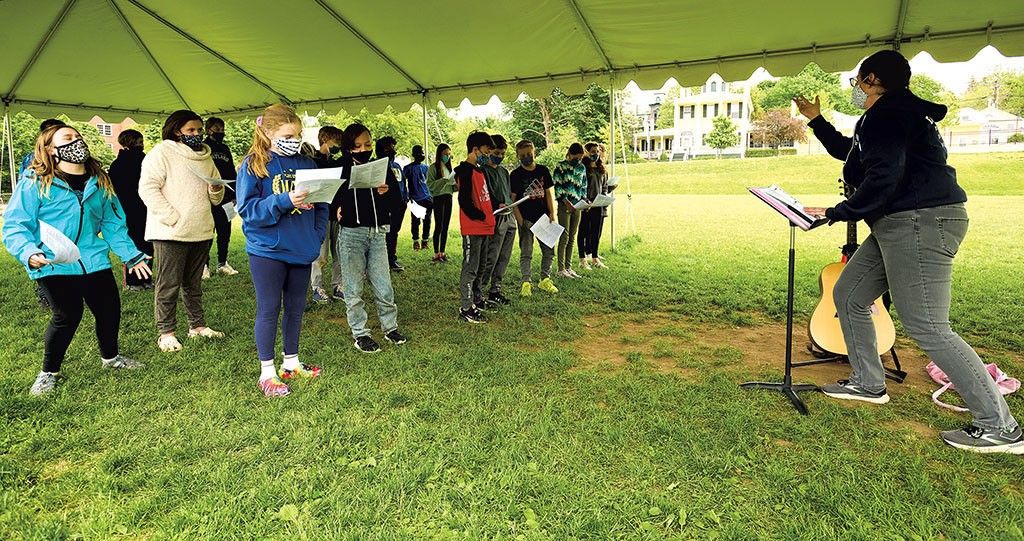
- Bear Cieri
- Betsy Nolan leads a rehearsal in an outdoor classroom at Edmunds School in Burlington
Imagine trying to teach chemistry without Bunsen burners. Now think of basketball practice without the hoop or ball. During the pandemic, music educators had to figure out a scenario just as absurd: teaching students who aren't allowed to play their instruments or sing in the classroom.
"Trying to teach music without singing is kind of like teaching math without numbers," said Betsy Nolan, a music teacher at Edmunds Elementary School in Burlington. "It's the crux of how we do the work that we do. There was a huge need to get creative."
As is tradition, elementary and high school ensembles from around Vermont will perform on the Church Street Marketplace as part of BDJF 2021. Though the students are excited and eager, preparation this year posed unprecedented difficulties. Nolan's fifth-grade chorus will perform on Monday, June 7. As recently as several weeks ago, they weren't allowed to sing inside their school.
"The ban on singing in the classroom that was in place for the majority of the school year was a huge hurdle," Nolan said.
The state allowed in-person music rehearsals to resume in February with strict guidelines. Before that, students could sing and play instruments outside as long as they were masked and socially distanced. Even during the winter months, Nolan took her kids out to sing in front of the school building for about 15 minutes at the start of each class.
Heather Joy, who teaches instrumental music at St. Johnsbury School, also led outdoor rehearsals for her extracurricular jazz band. Her students play BDJF on Tuesday, June 8.
"We were putting electrical cords through windows so we could plug in," Joy recalled. "We sat outside until it was too cold."
Through the school year, Nolan and Joy, like other Vermont teachers, made the best of a challenging situation. Both learned early on that remote music instruction was not especially effective.
"We tried to have some group lessons over Zoom and quickly found out those weren't gonna work because of the latency," Joy said, referring to the slight lag in sound and picture of videoconferencing. Individual lessons worked better remotely, but they weren't ideal.
Nolan and Joy said the pandemic has required them to approach music instruction in new ways.
"It's really made us lean into process over product," Nolan observed. She noted that music education is often focused on performances — concerts and recitals. The pandemic encouraged her to place a greater emphasis on more philosophical aspects of music, such as what it means to be a musician and to create musical ideas.
Still, there's no substitute for playing. Students who aren't encouraged to read on summer vacation often experience a "summer slide," meaning their reading ability has regressed by the time they return to school in the fall. Joy and Nolan noted similar atrophy in the performance skills of some of their students this year. And they worry about what that might mean for future cohorts.
Normally, Joy's students start playing instruments in fifth grade, but instrumental music wasn't offered at that grade level this year. Current fifth graders will start their instruments in the fall as sixth graders, a full year behind where they normally would be.
Still, Nolan feels lucky to have been able to see her kids in person during the pandemic, even when rehearsing wasn't possible. Music and performing arts instructors didn't have that option at Vermont schools that made a complete shift to remote learning.
"I think, from an equity standpoint, that's just really catastrophic," Nolan said. "Not being able to be there for the kids who need the most support ... it's really had a huge impact on the programs around the state."
Even when in-person rehearsals resumed, things weren't back to normal. In accordance with state guidance, Joy explained, students played with coverings on their horns and wearing masks — sometimes N-95s underneath cloth masks.
Wind and brass players had to play through a slit in their masks. Joy, a saxophonist, attested to the difficulty of that maneuver.
"I've broken so many reeds trying to shove [my tenor sax] through the hole in the mask," she said, chuckling.
Challenges aside, Nolan and Joy said their students have been resilient and excited by any opportunities that came their way.
"I've heard the kids say over and over that they just couldn't wait to get together and be in the same place," Joy said, adding that being in a band "is so much about the camaraderie.
"When you're sitting in the sound bath of the music playing around you," she said, "there's just nothing like that."
— J.A.
Edmunds Elementary School Fifth Grade Chorus, Monday, June 7, 1:30 p.m., at the Church Street Stage. Free.
The St. Johnsbury Middle School Jazz Band, Tuesday, June 8, 1:30 p.m., at the Church Street Stage. Free.
Main Street Block Party featuring the Ray Vega Latin Jazz Sextet and Barika
Saturday, June 12, 4 p.m., at Main Street and City Hall Park. Free.
The festival reaches a raucous climax with the Main Street Block Party. Performing on a stage under the Flynn's marquee, trumpeter Ray Vega and psych-fusion band Barika will team up for one hell of a bash.
Vega hosts "Friday Night Jazz" on Vermont Public Radio and teaches at the University of Vermont. Before moving to the Burlington area more than a decade ago, he was a sought-after player in New York City's jazz scene, trumpeting alongside legends such as Mongo Santamaría, Tito Puente and Ray Barretto.
Locally, Vega performs with multiple combos, including his own Ray Vega Latin Jazz Sextet. Pre-pandemic, he curated a weekly session in the lobby of Hotel Vermont.
Barika play an unclassifiable brand of globally conscious fusion. The band styles itself as "polyrhythmic ethereal dub-scape," an apt if somewhat bewildering description. Bandleader Craig Myers rocks the ngoni, a guitar of Malian origin, rooting the group's sound in African traditions as it explores psychedelic territory.
— J.A.
Marcie Hernandez
Friday, June 11, 3 p.m., at the Church Street Stage. Free.
When Marcie Hernandez released her song "Light a Torch" in 2017, a striking image accompanied it. It depicted her standing on the shores of Lake Champlain wearing a spiked crown, cradling a stone tablet and holding a torch aloft, clearly evoking the Statue of Liberty. But Hernandez wrapped herself in a Puerto Rican flag, highlighting a cultural clash between the United States and its Caribbean territory.
She wrote the song just after a catastrophic hurricane devastated the island where her parents were born. It concludes her 2020 debut album, Amanecer, a seven-track collection that was three years in the making. Throughout the record, whose title translates to "dawn," Hernandez mixes her American and Latin influences, singing in English and Spanish. In both languages, she highlights themes of hope and renewal.
Hernandez imbues her work with sensitivity and empathy, skills she's honed as a certified music therapist. Though often seen performing solo acoustic sets, she appears with a full band at BDJF 2021.
— J.A.
It Takes Two: Bill Ellis Curates Musical Conversations
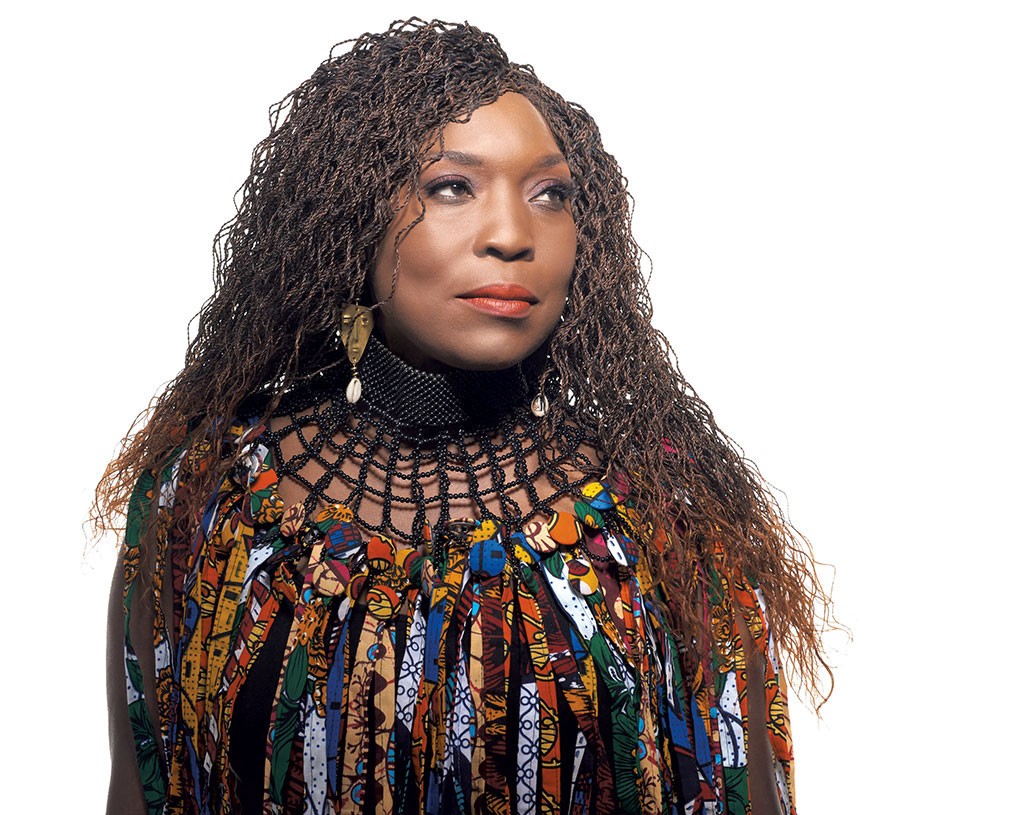
- Courtesy Of Michael Heeney
- Irene Webster
Most years, the headliners at the BDJF generate considerable buzz and dominate attendees' attention. This year, the focus is almost entirely on Vermont's talented cast of players, who provide the fest's exceptional foundation every year.
A new performance series called Conversations serves to showcase that talented community. The five-part series, with installments sprinkled through the fest's 10-day run, pairs local musicians from disparate cultural, racial, ethnic and artistic backgrounds and styles who have never played together or have only minimal experience partnering up. The artists were given virtually no parameters — just to be creative and collaborative.
Saint Michael's College associate professor of fine arts Bill Ellis curated the Conversations. "I was immediately struck by how wonderfully diverse and musically rich Burlington is as a city," he recalled of his move to Vermont about a decade ago.
Beginning in 2016, Ellis arranged the biennial New Voices series at the Flynn, which highlighted local artists from New American communities. Along with the rest of the Flynn's season, New Voices was put on hold in 2020.
As this year's festival quickly came together, Ellis was asked to arrange something akin to New Voices. His central question: "How can we hear our artists together in new ways or new configurations?" The result, Conversations, continues the mission of New Voices but goes further by creating a sort of musical diptych.
Ellis, an accomplished guitarist, said he's always loved albums that present what legendary bassist Bill Laswell called "collision music," or stylistic mashups. He name-checked Pharoah Sanders and Maleem Mahmoud Ghania's The Trance of Seven Colors and drummer Art Blakey and the Afro-Drum Ensemble's The African Beat as inspirational touchstones.
The five pairings of Conversations are expected to be BDJF highlights. They include violinist, activist and Flynn creative chair Daniel Bernard Roumain (aka DBR) and Nepali multi-instrumentalist Gopal Niroula; vocalist Amber deLaurentis and Costa Rican cumbia artist Maiz Vargas Sandoval; saxophonist Brian McCarthy and Ghanaian rapper Edwin Owusu (fka S.I.N.siZZle); jazz guitarist Paul Asbell and Malagasy guitarist Mikahely; and Kenyan singer-songwriter Irene Webster (of Afro-jazz band KeruBo) and pianist Tom Cleary.
"Ideally, it's the best of both genres," Reuben Jackson said of Conversations. The former host of "Friday Night Jazz" on Vermont Public Radio, Jackson now lives in Washington, D.C., and can't make it to the festival this year, he said. But he has his eye on the series as a likely pinnacle of this year's lineup — in particular, he noted, the Asbell-Mikahely pairing.
"Harmonically, melodically, [Asbell] has always been adventurous," Jackson said. "Maybe in a subtle way, but anything, I think, [that] he does with anyone who's considered from a different neighborhood is going to be wonderful."
"I think we have a really cool series," Ellis said, emphasizing Conversations' raw, on-the-fly energy.
"Nobody has a script here," he explained. "Each artist is going to take their own approach ... and create a really interesting set of music."
Asbell noted that the artists are diving into unknown territory.
"I think of myself as someone who tries to rise to the occasion, whatever the musical style and whatever musicians I'm with," he wrote in an email. "Being a good conversationalist means, among other things, being a good listener. It's pivotal when meeting someone whose background is different than one's own."
Webster believes the series will create new bonds among local artists and strengthen old ones.
"The sharing of ideas, whether in music or otherwise, opens one's perspective," she wrote in an email. A case manager for AALV, Webster said she and Cleary will interpret works of classic Black artists such as Nina Simone and Miriam "Mama Africa" Makeba.
"Because we are approaching [Juneteenth], we thought of doing a prelude of African diaspora, African American freedom and experiential songs," she continued.
Ellis called Conversations "a great way to highlight and feature the wonderful traditions that everyone brings to bear in Vermont."
— J.A.
Conversations: Amber deLaurentis and Maiz Vargas Sandoval on Saturday, June 5; DBR and Gopal Niroula on Sunday, June 6; Brian McCarthy and Edwin Owusu on Monday, June 7; Irene Webster and Tom Cleary on Tuesday, June 8; and Paul Asbell and Mikahely on Thursday, June 10. All shows at 12:30 p.m. on the City Hall Park Stage. Free.
JACK Quartet and Matthew Evan Taylor
Sunday, June 13, 3 p.m., at Smalley Park. Free.
Matthew Evan Taylor might be Vermont's buzziest composer. The Middlebury College assistant professor of music is always creating. His 2020 album Say Their Names arrived only weeks after George Floyd was murdered by a Minneapolis police officer. It cataloged Taylor's profound grief through seven tracks of raw emotional expression. The composer recently concluded a five-part album cycle called The Unheard Mixtapes, a heady collection of free improvisational music commissioned by the New York City collective Metropolis Ensemble.
On the final day of the festival, Taylor will team up with NYC's JACK Quartet, a modern ensemble known for boundary-pushing collaborations with artists of all disciplines. Together, the multi-instrumentalist and the string players will present two of Taylor's pieces. The string foursome will also debut a new composition, String Quartet No. 13, written by renowned trumpeter Wadada Leo Smith.
— J.A.
Black, Live Art Matters: A Q&A with Daniel Bernard Roumain
Daniel Bernard Roumain describes himself as an "activist artist," and the order of those words is intentional. Roumain, aka DBR, is an acclaimed educator, composer and violinist. He holds a doctorate in music composition from the University of Michigan and is currently institute professor and professor of practice at the Herberger Institute for Design and the Arts at Arizona State University.
Among the New York City-based composer's many honors is an Emmy nomination for his work with ESPN, and he has collaborated with artists ranging from Philip Glass to Lady Gaga. His music fuses classical, opera, hip-hop, jazz, rock and pop so fluidly that the New York Times described him as "about as omnivorous as a contemporary artist gets."
But activism is at the core of Roumain's artistry. The son of Haitian immigrants, he's guided in everything he touches by considerations of race, equity, diversity and inclusion. That's evident in the titles of recent works such as America, NEVER Beautiful; Why Did They Kill Sandra Bland?; and They Still Want to Kill Us, the last of which centers on the Tulsa Race Massacre of 1921.
Those principles also inform Roumain's numerous administrative roles with arts organizations around the world, including as the current creative chair of the Flynn, where he was previously artist-in-residence.
Roumain will perform three times at this year's BDJF: with blues/R&B band Dwight & Nicole on Saturday, June 5; as part of the Conversations series with Nepali multi-instrumentalist Gopal Niroula on Sunday, June 6; and with contemporary classical ensemble TURNmusic, also on June 6.
He recently answered questions by email from California.
SEVEN DAYS: You were the Flynn artist-in-residence in 2019 and last year became its first-ever creative chair. As we (fingers crossed) emerge from the pandemic, and the Flynn resumes more programming of all kinds, how do you envision your role?
DANIEL BERNARD ROUMAIN: I see my role as an administrator and artist unfolding, in that order, towards administrative work that will help the Flynn internally navigate new, precious terrain full of potential and possibility, and also continuing to collaborate as an artist with a wide range of artists and ensembles.
We are all coming out of a COVID-induced hibernation. What did we dream about while we were alone and asleep? Whom did we lose? How do we mourn as a community? What shouldn't change, and what needs to change? What role and responsibility do the living have in a time of death and dreams? These are some of the questions I am asking myself and hope to answer in a deep, loving partnership with the Flynn.
SD: What kinds of things do you hope to see from the Flynn moving forward?
DBR: More of everything! More offerings. More educational programs. More challenging work by innovative and heroic artists. More community-based initiatives. More work around race, diversity, equity and inclusion. More joy and love for more people!
SD: Between the pandemic, nationwide racial justice protests, the election, the insurrection, the Derek Chauvin verdict and countless other events, the past 15 months or so have been ... tumultuous. How has this time period affected or informed you artistically?
DBR: Before March 13, 2020, I was an activist artist. I was working with other activist artists like the writer Marc Bamuthi Joseph (who has appeared at the Flynn), the Hollywood film composer Tamar-kali, the choreographer Bill T. Jones, and the film director Yoram Savion. The titles of my work demonstrate that commitment.
I am a Black man in America. I love this country, but I am also terrified of it. I don't know if America will ever truly love me, or Black people. We will find out.
SD: You have spent a lot of time performing, creating and collaborating in Vermont. What keeps bringing you back?
DBR: The people. There is so much love here. There is so much humanity here. There is so much we could all do together.
At the same time, there is so much racism here, too. So, my role is to meet that hate with a precise love that shows a better way for those racists' minds to reconsider their hatred and engage in what should be a shared, radical morality.
SD: Can you tell us a little bit about your performances at BDJF? What are you most excited about?
DBR: I am excited to play for a live audience again. I'm excited to work with Dwight & Nicole and TURNmusic. I'm excited to see and hug and hear the Flynn staff. I can't wait to embrace [executive director] Jay Wahl and Steve MacQueen and [associate director of programming] Madeline Bell and let them know we are all going to be all right. I'm excited to just keep giving and going and doing and dreaming with the Flynn.
SD: What does it mean to you for the BDJF to return now?
DBR: That Black, live art matters — and always did.
— D.B.
Dwight & Nicole featuring DBR, Saturday, June 5, 3 p.m., at Roosevelt Park. Free.
Conversations: DBR and Gopal Niroula, Sunday, June 6, 12:30 p.m., at City Hall Park Stage. Free.
TURNmusic featuring DBR, Sunday, June 6, 4 p.m., at Church Street Stage. Free.
The original print version of this article was headlined "The Shape of Jazz to Come"
Got something to say?
Send a letter to the editor
and we'll publish your feedback in print!
Tags: Music Feature, Burlington Discover Jazz Festival, Delvon Lamarr Organ Trio, Dwight & Nicole, Brian McCarthy, Mal Maïz, A2VT, Heather Joy, Betsy Nolan, Ray Vega, Marcie Hernandez, Bill Ellis, DBR, Gopal Niroula, Amber deLaurentis, Edwin Owusu, Paul Asbell, Mikahely, Irene Webster, Tom Cleary, Reuben Jackson, Matthew Evan Taylor, JACK Quartet, Wadada Leo Smith, Daniel Bernard Roumain, Video
About The Authors

Jordan Adams
Bio:
Jordan Adams joined Seven Days as music editor in 2016. In 2021, he became an arts and culture staff writer. He's won awards from the Vermont Press Association and the New England Newspaper and Press Association. In 2022, he became a freelance contributor.
Jordan Adams joined Seven Days as music editor in 2016. In 2021, he became an arts and culture staff writer. He's won awards from the Vermont Press Association and the New England Newspaper and Press Association. In 2022, he became a freelance contributor.

Dan Bolles
Bio:
Dan Bolles is Seven Days' assistant arts editor and also edits What's Good, the annual city guide to Burlington. He has received numerous state, regional and national awards for his coverage of the arts, music, sports and culture. He loves dogs, dark beer and the Boston Red Sox.
Dan Bolles is Seven Days' assistant arts editor and also edits What's Good, the annual city guide to Burlington. He has received numerous state, regional and national awards for his coverage of the arts, music, sports and culture. He loves dogs, dark beer and the Boston Red Sox.
Latest in Category
Speaking of...
-

Soundbites: Trouble & Together at the Flynn
Apr 10, 2024 -

On the Beat: Vermont Native Adam Tendler Returns, New Music From Jesse Taylor Band and Justin Levinson
Apr 10, 2024 -

Adi Oasis to Curate the 2024 Burlington Discover Jazz Festival
Mar 27, 2024 -

On the Beat: RIP Reuben Jackson, New Music From Audrey Pearl
Feb 21, 2024 -

Soundbites: The Year That Was
Dec 27, 2023 - More »


























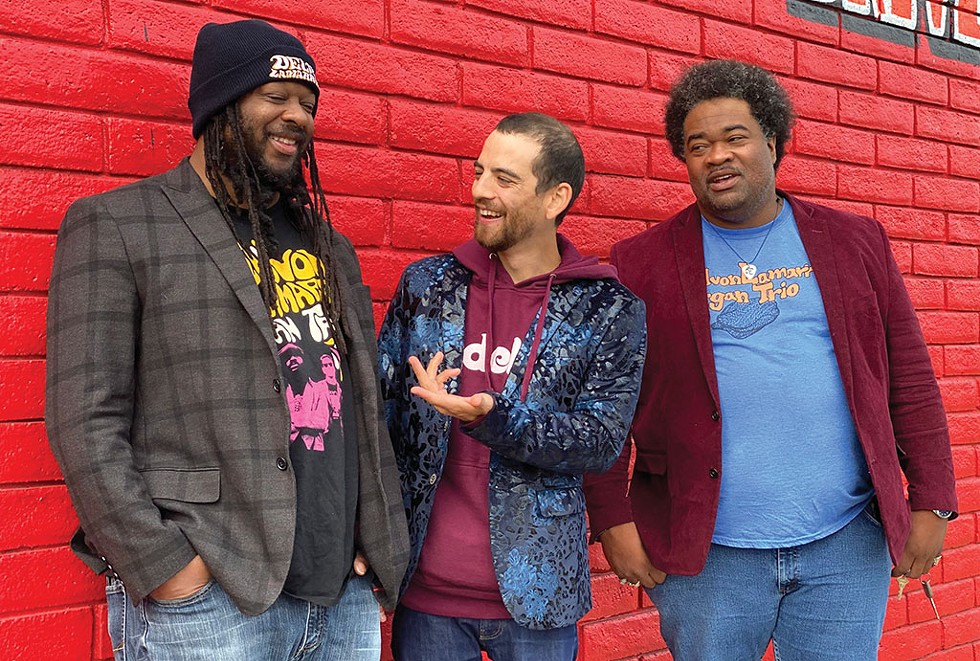
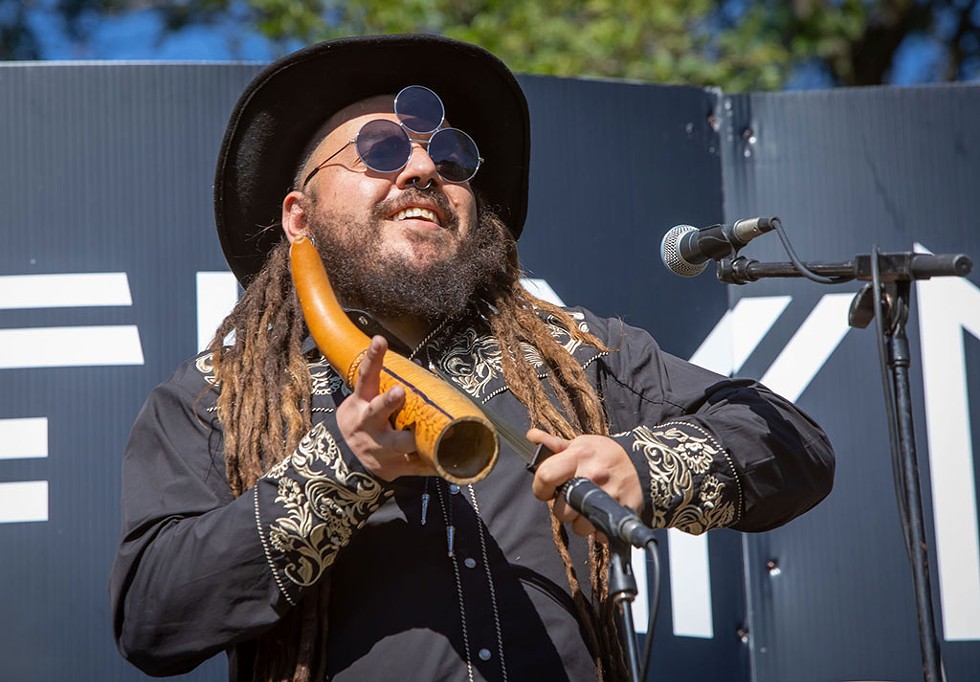
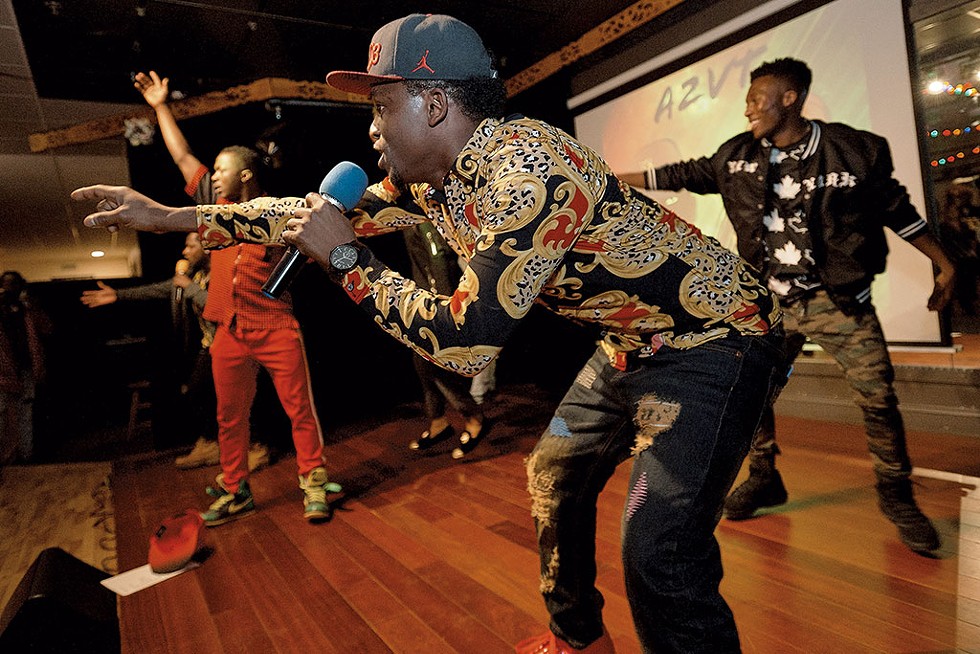
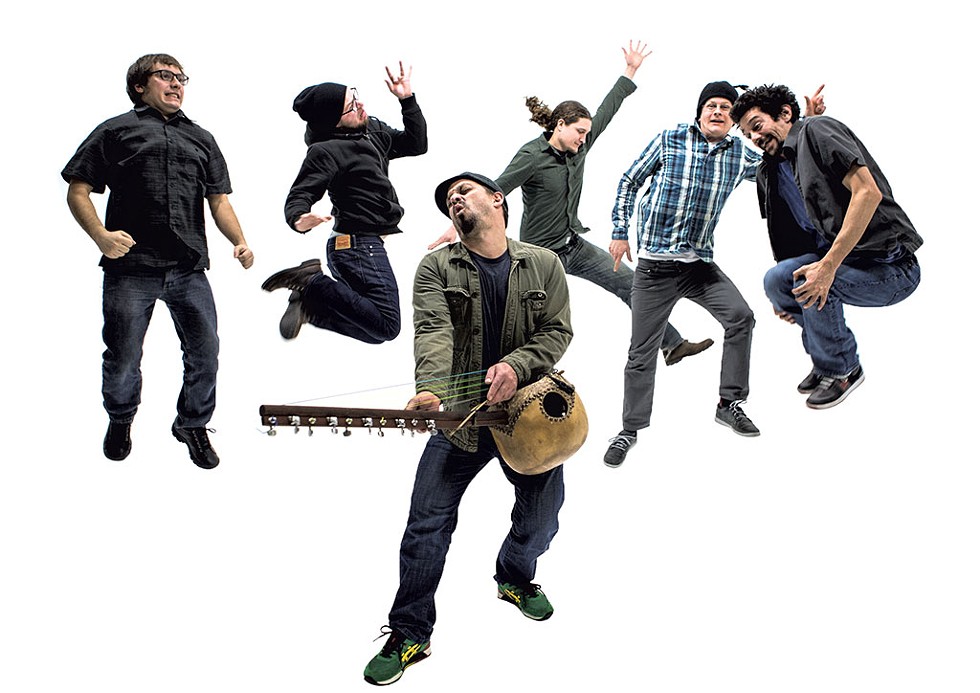
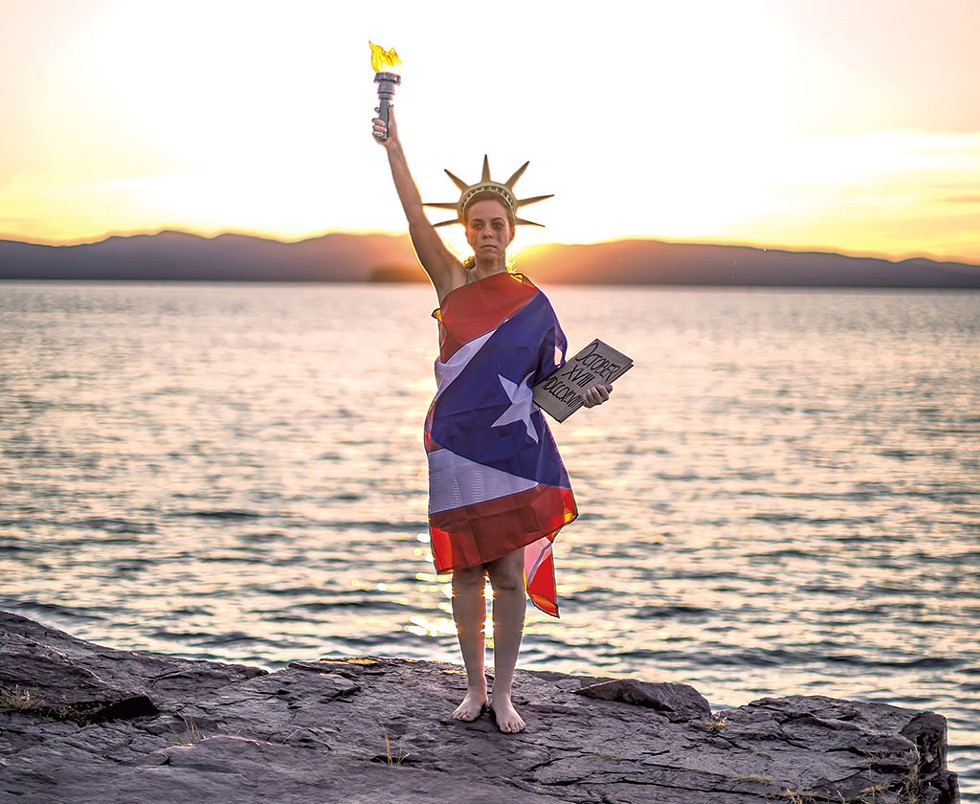
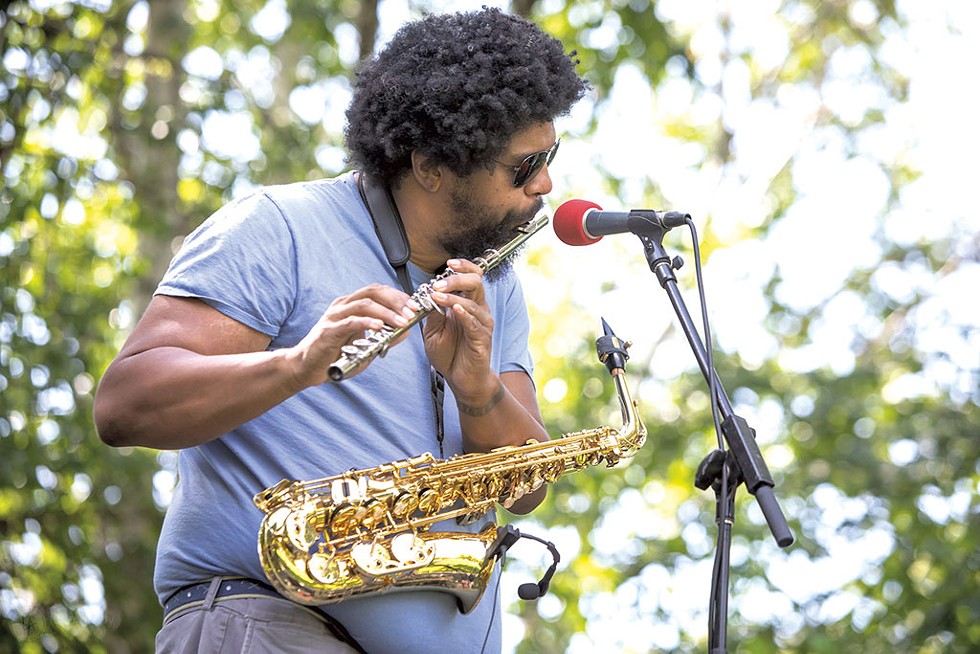
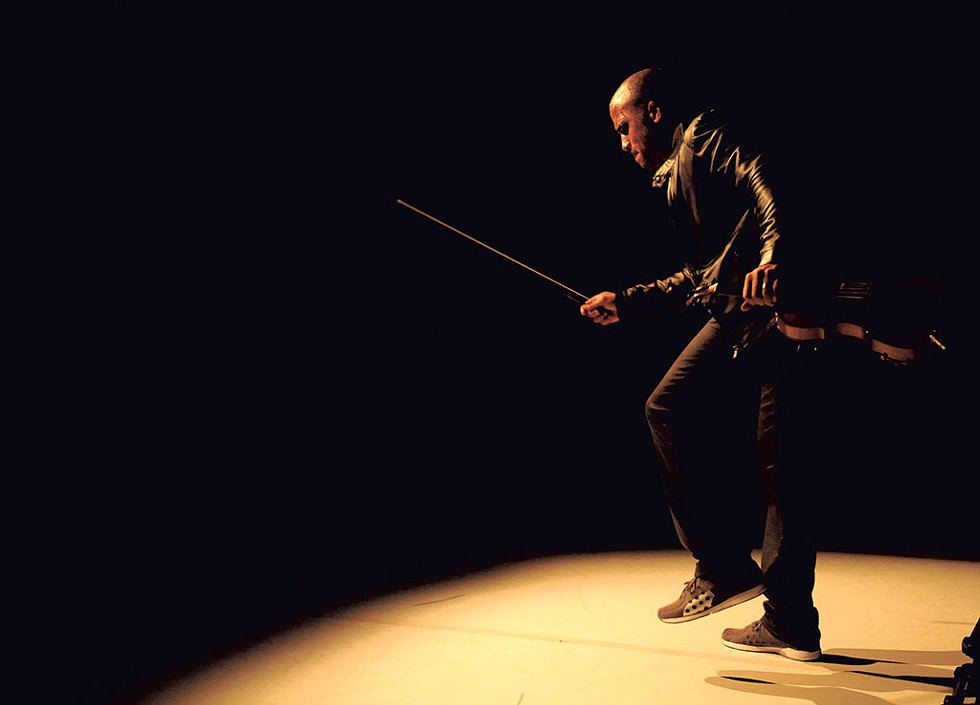


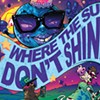
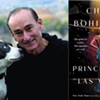
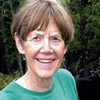
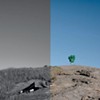

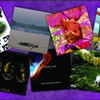




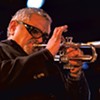


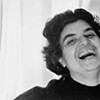

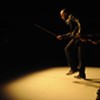



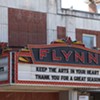
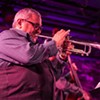

find, follow, fan us: